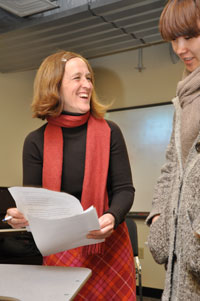"In my creative and expository writing courses I want to give students a forum for their ideas, an understanding of different genres in writing, and encouragement. In creative writing, some may think they have a preference for a certain genre, like poetry or stories, but when I expose them to another genre, like playwriting—which they usually haven't tried—they're often surprised to find that they can do that, too."
"Literature, which I also teach, helps us connect to something eternal about the human condition. I want my students to see that, and at the same time gain a sense of how to use language. I like to look at literature as creative writing, and to try to help students see, in addition to larger elements like 'theme,' how the writer is constructing the story. What are they using to reveal what part of their emotional life, and what kind of craft are they using to construct that story?"
"My class is really about language and words, and exposing students to authors they might have rejected before, like Chekhov. It's getting them to see that it's not onerous and that it's a joy. So we might look at his classic story, 'Lady with a Pet Dog,' which is so beautiful and polished. I like to look at the way Chekhov uses drama, and how his characters change. And I like to make my students aware that Chekhov at one point was what they are: young and just trying to write something!"
"Composing music is very formalistic, and you need a lot of esoteric knowledge to do that. Because Berklee students have composed music, they can make the leap to composing an essay or creative piece. You don't have to have the same esoteric knowledge because you're dealing with language, which we all naturally have."
"I think writing and music actually have a lot in common: both are auditory arts. I try to get students to see that great prose and poetry is fundamentally about creating great sound. It's through language, but it's still sound. I want my students to be attuned to the musicality of the language, even when they're writing something seemingly straightforward."

